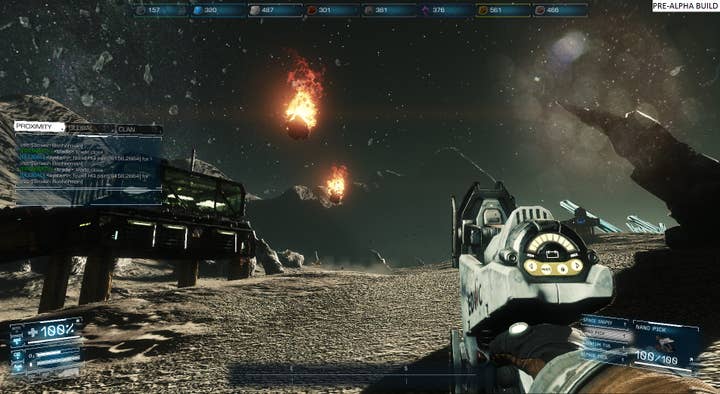Atari: "By god, we're going to do this right"
One of the industry's pioneering companies is back in business, but can it deliver on its own broad ambitions?
For a great many people, the words "videogames" and "Nintendo" are interchangeable, one of those rare examples of brand ubiquity only made possible by just the right products at just the right time. But there is another, Back To The Future-esque timeline in which that honour belongs to Atari, in which the great crash of 1983 never happened, and Nolan Bushnell's company went on to define the games industry in the same way that Microsoft did for home computers.
In this timeline, however, it's possible for an Atari console to be the first you ever played, and yet scarcely be aware that the company still exists at all. Indeed, it came perilously close to that exact fate, filing for bankruptcy at the start of 2013 before eventually finding a path back out before the close of the same year. Todd Shallbetter joined Atari in 2005, back when it employed 490 people in its New York City office alone, and he remained with the company through the "very tough patch" that brought the entire organisation to its knees.
"It's an interesting challenge with any game company when you reach a certain size and you have a lot of in-house development," he says, sitting in front of a bank of screens showcasing Atari's new product line-up. "You're really feeding this giant machine, especially in the challenging retail environment that we all saw happen.
"We're contracting out all of our dev work and a lot of other functions. We think it's a model that works"
"The swift change and the decline of a lot of that great retail marketplace that we enjoyed really affected us. We weren't scaled properly, so we had to take a bite."
Of course, implicit in that "bite" were a huge number of lost jobs and stalled careers. The Atari that emerged on the other side shared little with the vast corporation that failed to adapt to the changing times. The core team were all veterans of the company, including Fred Chesnais, who returned as majority shareholder and CEO. But that core team, Shallbetter says, was 11 people in a small office in New York City, each one expert in an essential aspect of running a publishing business.
"We're super nimble," he says, insisting that the extreme economy of Atari's workforce is by design rather than necessity. "It's an executive production model, where we're contracting out all of our dev work and a lot of other functions. We think it's a model that works.

"I dare say that every single person who sits in a seat in that office should be in that seat. We all touch every product. We aren't doing things in silos, where there's nine producers on a project. That model has proven to be outdated and inefficient and not high yield.
"'High yield' is really a catch-phrase within our organisation. We look for high yield output out of everybody, and in the processes that we generate. We're about really getting the most out of as little as we can. Scalability is absolutely key. We know what's happened to a bunch of our top-heavy peers. We've seen it. I won't name names, but I don't think I need to. I think we all know."
However, the company has retained its scale in one crucial area: the vast library of intellectual properties it amassed over 40 years of making and publishing games, the majority of which emerged from the bankruptcy along with the its drastically reduced workforce. That IP stable includes some of the most famous brands in the history of the industry. The question now is how best to make use of them, and Atari's future prosperity will likely depend on these early bets being the right ones.
"We look for high yield output out of everybody, and in the processes that we generate. We're about really getting the most out of as little as we can"
A brief glance around the room - a well-appointed suite at San Francisco's W Hotel - suggests that the company's initial strategy isn't short of ambition, even if it does betray a certain lack of focus. There's Alone in the Dark: Illumination, which owes as much to Resident Evil 4's ballistic action as the more cerebral puzzle-solving of the 1992 original. Asteroids Outpost reinterprets the 35 year-old arcade classic in the context of the on-trend sandbox survival genre. There's a new Rollercoaster Tycoon for mobile devices, alongside a gamified fitness app called Atari Fit and an "LGBT-themed" social sim called Pridefest, in which players can design and customise their own gay pride parade. Not represented here are the company's social casino products, its licensed apparel, or its return (in an as yet unspecified capacity) to the hardware business.
This broad sweep of ideas and genres and product categories neatly encapsulates one of Atari's more difficult problems, one hinted at in the opening paragraph of this article. There can be no doubting the fame of the Atari brand, but what does that really mean in 2015, after so many twist and turns and reinventions? My father played Atari games decades ago, I have played Atari games within the last five years, but there is an ocean of difference between our individual relationships with that brand and our expectations as consumers in general. Indeed, for younger demographics, it's safe to assume that there is little or no brand recognition at all. So who, exactly, is a DayZ-esque take on Asteroids actually for?

"We try to, of course, extend this brand goodwill to a really broad based mass-market audience," Shallbetter says. "To that point, a particular challenge for us is making our IPs and our games relevant to a newer audience. While many of these kids, or younger users, know about the brand, it doesn't necessarily resonate with them.
"It's a blessing that we have this fantastic catalogue of IPs, and we have some dynamic and really exciting studios working on these games to bring them up to speed with current technologies, current gameplay expectations. But it's also a curse in that we could make the greatest, earth-breaking, disruptive game in the world, then somebody'd say 'Yeah, but it's not Asteroids.' It's a first class problem, I think.
"We listen really closely. It's really all we do. The first step in any of our meetings is always the community first. Let's get the web pages up now. Let's get the forums up now. Let's start this communication. With RollerCoaster Tycoon, the boards are alive right now. We're doing production blogs. We're communicating very consistently. People are up, they're posting, the community hub is open on Steam."
"We don't have to feed a beast of hundreds of employees in multiple locations as we've done in the past. We learned our lessons"
For both Asteroids Outpost and Alone in the Dark: Illumination - the most ambitious projects currently in development at Atari - that community engagement is a basic necessity. The former hit Steam Early Access at the end of March, and open lines of communication with your paying customers is a standard requirement of that model. At present, community reviews of the game are mixed, with the most common points of complaint being technical issues and a lack of things to do. Of course, these aren't exactly uncommon in Early Access releases, but the game's developer, Salty Studios, has become unresponsive in recent weeks.
At the time of writing, the studio's Steam community hub account has posted just twice in the month since April 7, and nothing at all since April 23. By contrast, in the month before that (starting March 7) it posted 37 times. The most recent thread on the game's discussion boards, dated May 8, asks if there is still work being done on the game at all, given an apparent lack of recent updates.
Alone in the Dark: Illumination presents a different problem. Atari made the game available for "pre-purchase" through Steam in October 2014, with a scheduled release promised before the end of the year. Right now, with June fast approaching and two beta weekends in the bag, the listed release date is still only a vague, "Early 2015." The game's developer, Pure FPS, is at least in contact with the community, reassuring its players in a post dated May 4 that a release date will be announced soon.

As anyone who has peered behind the curtain of game production will know, the reasons why a development team is unable to maintain persistent communication with an audience - or deliver on a planned release date, for that matter - are legion. Indeed, many of them could be related to the work itself, perhaps a symptom of redirecting limited resources to making a better product. But there is a clear a disconnect between the ideals Shallbetter describes and the reality of how Atari's biggest and most important bets are taking shape.
One thing is certain: after such a long and fraught journey, the Atari brand may not have many more opportunities to trade on its legacy. Asteroids Outpost and Alone in the Dark: Illumination are ambitious games, tilting at the AAA market in which the company was once a key player. It is Atari's goal, Shallbetter says, to become that again, and these are the first, tentative steps in getting there.
"Yeah, we would like to sell hundreds of thousands of millions of copies of things, but I think that the way we're set up now we get a little bit more wiggle room. We don't have to feed a beast of hundreds of employees in multiple locations as we've done in the past. We learned our lessons, and we're afforded a very unique opportunity to keep this legacy moving forward.
"Under current management now, we're far more focused on creating robust and fulsome game experiences, complete game experiences. We're not going to try to half-step this. I know the CEO consistently says over and over, 'By God, we're going to do this right.' We live and breathe that."

